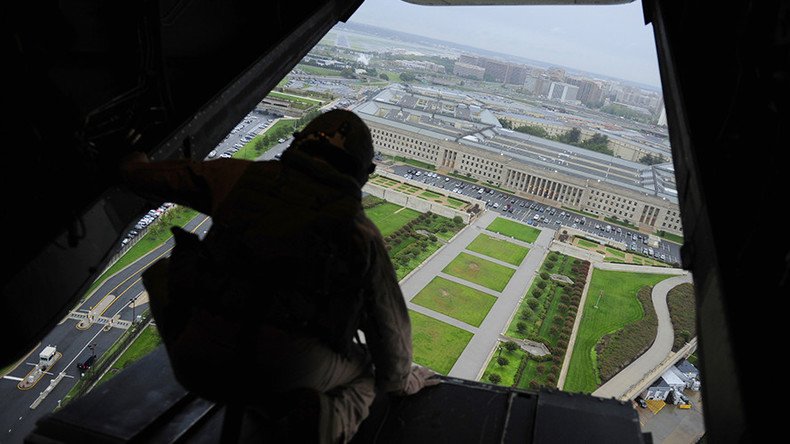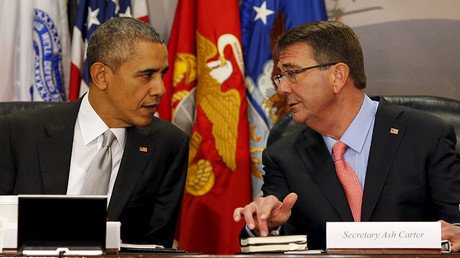Not enough guns: More Americans concerned US military no longer #1

Americans are increasingly unsure if the US is the world's top military power, according to a new poll. A rising number of Americans say the US spends too little on the military, even as the Pentagon budget is greater than the next seven nations combined.
Americans are evenly split, 49 percent to 49 percent, over whether the US military is clearly the "No.1 in the world militarily," according to a new Gallup poll. This is a marked difference from 2015, when 59 percent of respondents said the US was top dog, as opposed to 38 percent who disagreed.
Gallup said the 49 percent percent who see the US as No. 1 is the lowest it has recorded since first asking the question in 1994.
Americans Less Likely to See U.S. as No. 1 Militarily... https://t.co/Es3FIuYFmRpic.twitter.com/VVyERUenjM
— GallupNews (@GallupNews) February 15, 2016
The view that it is important for the US to be the top military in the world remains popular among Americans, as 67 percent agreed. Thirty-two percent said it was "not that important." Two out of three Americans supporting the idea that it is important for the US to be the top military in the world has been a constant since 1994.
Meanwhile, the number of Americans who told Gallup they believe the US is spending to little on the military is on the rise. Currently, 37 percent of respondents – up from about 23 percent in 2011 – said the Pentagon is not getting enough money, while 32 percent said the military spending was too much and 27 percent said it was about right.
So you think the Pentagon's been "gutted?" Let's ask the Vice Chairman of the Joint Chiefs... pic.twitter.com/tTbKlnYtLD
— Pentagon Choices (@PentagonChoices) February 11, 2016
Republicans were more than three times as likely as Democrats to think that the US spends too little on its military, with 66 percent of Republicans saying so. Twenty percent of Democrats and 27 percent of independents agreed. Only nine percent of Republicans said spending is too much, with 39 percent of independents and 45 percent of Democrats agreeing.
A consistent line among conservative politicians, including Republican presidential
candidates, is that the US military has been beleaguered and underfunded during the Obama years. Spending levels decreased slightly as Iraq and Afghanistan wars came to an official end, yet the US remains far and away the world's most funded military.
Obama vowed to end the #Pentagon’s ‘slush fund.’ But he never did. https://t.co/qCLmZ5R57R@DanLamothe#Budget2017pic.twitter.com/4Yt9Wn5kaw
— Win Without War (@WinWithoutWar) February 11, 2016
Military spending rose sharply following the terror attacks of September 11, 2001, and continued to rise to around $700 billion (in inflation-adjusted US dollars) until about 2010, according to the Stockholm International Peace Research Institute (SIPRI), which tracks global military expenditures, including spending on overseas operations, which the US budget separates from military funding.
From Wasted Ammo to a Runaway Blimp, How the Pentagon Mismanaged $33 Billion @TheFiscalTimeshttps://t.co/4a8kWzMiEhpic.twitter.com/5G1dNTBEaF
— Pentagon Budget (@PentagonBudget) February 12, 2016
In 2014, even though spending went down slightly, the US still spent $610 billion on its military, SIPRI reported, representing about one-third of global military spending. The next seven nations on the list – China, Russia, Saudi Arabia, France, the United Kingdom, India, and Germany – spent $601 billion combined in 2014.
"US military spending continues to run at historically high levels and is around the same level in real terms as at its previous peak in the late 1980s," SIPRI said last April.
DETAILS: US defense budget focuses on changing security environment - Carter https://t.co/65t2IIo26zpic.twitter.com/i1DZQXNuIz
— RT America (@RT_America) February 2, 2016
Two weeks ago, the Obama administration announced a $582.7 billion request for Pentagon funding in fiscal year 2017, including a fourfold increase in military spending in Europe.
US Defense Department Secretary Ashton Carter said the budget was guided by five factors: the growing power of Russia and China; the threat of North Korea to the US and its Pacific allies; Iran's “malign influence” against US allies in the Gulf; and the ongoing fight against Islamic State (IS, formerly ISIS/ISIL).
Pentagon’s 2017 Budget is Mardi Gras for Defense Contractors https://t.co/ZhPcjAgkVLpic.twitter.com/qW83Pj8zol
— Straus Reform (@StrausReform) February 11, 2016















